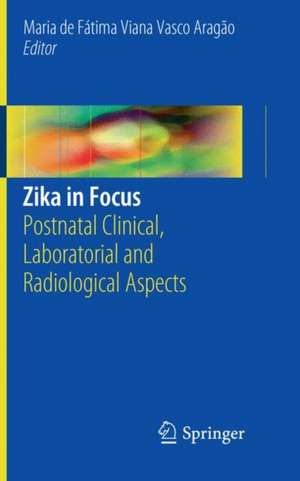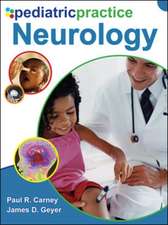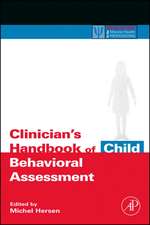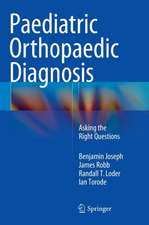Zika in Focus: Postnatal Clinical, Laboratorial and Radiological Aspects
Editat de Maria de Fátima Viana Vasco Aragãoen Limba Engleză Paperback – 18 aug 2018
This book addresses the most important postnatal features of Zika virus infection, providing important information on its epidemiology, pathology, clinical aspects, imaging and laboratory diagnosis. Since the report of a Zika virus infection epidemic in Northeastern Brazil in 2015, the world has paid close attention to this emergent disease. Historically, this has been the third outbreak of Zika infection described (preceded by outbreaks in Micronesia and French Polynesia), but for the first time the association with congenital microcephaly and other neurological co-morbidities in infants from women infected with the Zika virus was observed. Since then, government bodies, public health agencies, medical societies and scholars have joined forces to understand this disease, and to promote its prevention and management.
Currently, the relationship between Zika virus and microcephaly is well established, as well as the most characteristic findings of congenital Zika syndrome (e.g. microcephaly, arthrogryposis, ophthalmologic and hearing abnormalities). Also, the spectrum of the disease’s severity has broadened, with less severe cases (without microcephaly) being recently recognized. Even so, there is currently a dearth of material on Zika virus infection for healthcare professional around the world.
Addressing that gap, Zika In Focus – Postnatal Aspects aims to help the medical community worldwide by presenting the most important features of Zika virus infection from a postnatal perspective. It is intended to all professionals and researchers interested in this condition, especially paediatricians, radiologists and neurologists, offering them a practical guide to recognizing congenital Zika syndrome in its many aspects and focusing on the radiological pattern of lesions that can be found from the mild to the most severe cases.
| Toate formatele și edițiile | Preț | Express |
|---|---|---|
| Paperback (1) | 323.84 lei 38-44 zile | |
| Springer International Publishing – 18 aug 2018 | 323.84 lei 38-44 zile | |
| Hardback (1) | 394.60 lei 38-44 zile | |
| Springer International Publishing – 7 mar 2017 | 394.60 lei 38-44 zile |
Preț: 323.84 lei
Preț vechi: 340.88 lei
-5% Nou
Puncte Express: 486
Preț estimativ în valută:
61.98€ • 64.46$ • 51.16£
61.98€ • 64.46$ • 51.16£
Carte tipărită la comandă
Livrare economică 08-14 aprilie
Preluare comenzi: 021 569.72.76
Specificații
ISBN-13: 9783319852041
ISBN-10: 3319852043
Pagini: 156
Ilustrații: VI, 156 p. 75 illus., 29 illus. in color.
Dimensiuni: 127 x 203 mm
Ediția:Softcover reprint of the original 1st ed. 2017
Editura: Springer International Publishing
Colecția Springer
Locul publicării:Cham, Switzerland
ISBN-10: 3319852043
Pagini: 156
Ilustrații: VI, 156 p. 75 illus., 29 illus. in color.
Dimensiuni: 127 x 203 mm
Ediția:Softcover reprint of the original 1st ed. 2017
Editura: Springer International Publishing
Colecția Springer
Locul publicării:Cham, Switzerland
Cuprins
Historical and epidemiological background.- Clinical and laboratory findings.- Radiological characteristics of congenital Zika syndrome.- Less frequent radiological findings.- Radiological differential diagnosis.- Histopathological findings.- Follow-up and rehabilitation.
Recenzii
“The purpose is to provide the most current references on the clinical aspects of this viral disease and its effect on children. … The book certainly meets this goal. The audience is healthcare providers of women and children. However, it will also be of interest to radiologists and public health administrators.” (Jay P. Goldsmith, Doody’s Book Reviews, April, 2017)
Notă biografică
Maria de Fátima Viana Vasco Aragão is a Professor of Radiology at the Maurício de Nassau University and scientific director of the Multimagem Diagnostic Centre in Recife, Brazil. She received her medical degree from the Federal University of Pernambuco in 1987 and completed her residency in radiology at Ribeirão Preto Faculty of Medicine, University of São Paulo, Brazil. She completed fellowships in CT, MRI and neuroradiology at Med Imagem Beneficencia Portuguesa, São Paulo, Brazil, and later at Mount Sinai Hospital Center in New York, USA. In 2010 she received her PhD in Neuroscience from the Federal University of Pernambuco in Recife. She is a founding member of the Brazilian Society of Neuroradiology, full member of the Brazilian College of Radiology and a member of the American Society of Neuroradiology, the European Society of Radiology and the Radiological Society of North America. She served as president of the Pernambuco Radiology Society from 2014 to 2016, being recently re-elected for 2016 to 2018.
Textul de pe ultima copertă
This book addresses the most important postnatal features of Zika virus infection, providing important information on its epidemiology, pathology, clinical aspects, imaging and laboratory diagnosis. Since the report of a Zika virus infection epidemic in Northeastern Brazil in 2015, the world has paid close attention to this emergent disease. Historically, this has been the third outbreak of Zika infection described (preceded by outbreaks in Micronesia and French Polynesia), but for the first time the association with congenital microcephaly and other neurological co-morbidities in infants from women infected with the Zika virus was observed. Since then, government bodies, public health agencies, medical societies and scholars have joined forces to understand this disease, and to promote its prevention and management.
Currently, the relationship between Zika virus and microcephaly is well established, as well as the most characteristic findings of congenital Zika syndrome (e.g. microcephaly, arthrogryposis, ophthalmologic and hearing abnormalities). Also, the spectrum of the disease’s severity has broadened, with less severe cases (without microcephaly) being recently recognized. Even so, there is currently a dearth of material on Zika virus infection for healthcare professional around the world.
Addressing that gap, Zika In Focus – Postnatal Aspects aims to help the medical community worldwide by presenting the most important features of Zika virus infection from a postnatal perspective. It is intended to all professionals and researchers interested in this condition, especially paediatricians, radiologists and neurologists, offering them a practical guide to recognizing congenital Zika syndrome in its many aspects and focusing on the radiological pattern of lesions that can be found from the mild to the most severe cases.
Caracteristici
A didactic and practical book on this emergent disease and intended for general health professionals, especially pediatricians and radiologists Provides succinct epidemiological, clinical, radiological, laboratory and pathological approaches to recognizing congenital Zika syndrome Includes complementary information on follow-up and rehabilitation









